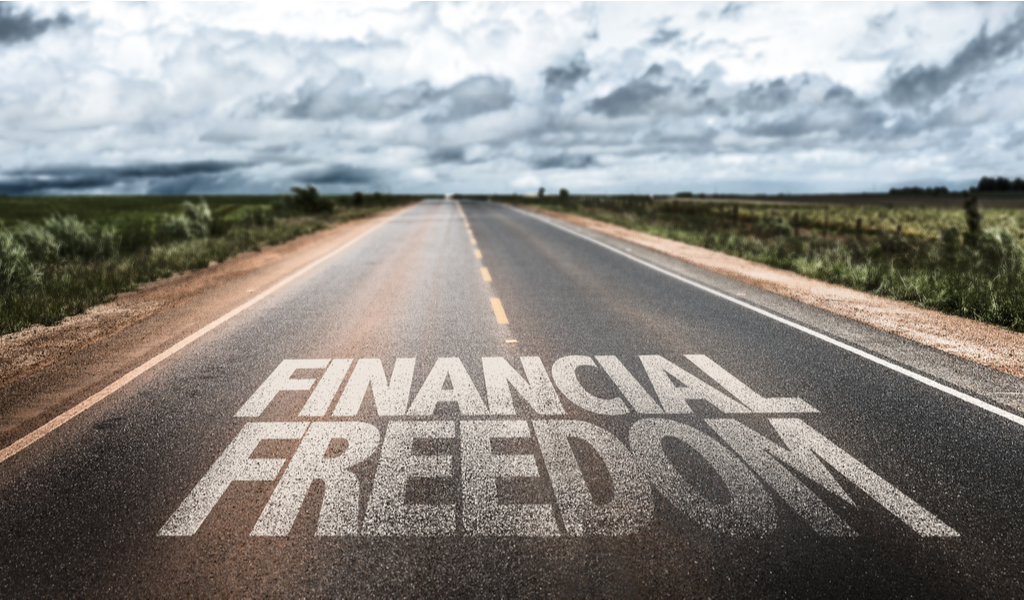Financial freedom is an almost ethereal concept to many, and one that you may have deemed impossible because you don’t think you can ever truly get there. But that depends on what your personal definition of the term means.
For one person, it could mean having enough money in the bank so that they never have to work again or depend on anyone else for money, for another, it could be as simple as earning enough to move out of their parent’s basement. The question you have to ask yourself is this: why do you get up for work every day?
Whether it is to improve your credit score and buy your family a house or build a rock-solid retirement fund, you can definitely achieve financial freedom by making some smart choices. We’ve gathered 8 ways for you to get started on that goal!

Increase Your Credit Score
Almost any financial goal you may have is going to benefit from a higher credit score, from signing up for a credit card to leasing a car or buying property. Luckily, there are several things you can do to make sure your credit score is going up and not staying stagnant, or worse, losing points!
The first thing to do is to track your score diligently so that you can identify negative areas and focus on them. In general, you should always pay your bills on time, keep your credit card balances at a minimum, pay off as much debt as possible, and avoid applying for credit unnecessarily.
Lesser-known actions that can help you up your credit report include asking a family member with good credit to add you to their account as an authorized user, keeping older unused credit cards open, borrowing “good credit”, and reviewing your credit report and disputing any inaccuracies with the credit bureaus.
Pay Off Credit Card Debt
As mentioned earlier, it’s important to make sure you don’t have outstanding debt, but some debt is worse than others. Credit card debts are one of the worse ones as they come with higher interest rates and shorter payback periods.
One way you can get rid of a large amount of credit card debt is by taking out a loan specifically to pay them all off. This way, you only have to deal with one bill every month and lower the risk of forgetting to pay one or the other. You can also get a low-interest loan and negotiate the payback period to give you some breathing space.
Start Investing
If you’re making enough money to save some of it every month, you make enough money to start investing! Think about it, your money isn’t doing much sitting idly in a bank account other than losing value over time.
One of the easiest ways to invest your money is in the stock market, and before your brain starts pulling up images of skyscrapers and crowded rooms with massive digital boards displaying constantly changing numbers, stop! With the internet, investing in stocks is as easy as 1, 2, 3. You can do it from the comfort of your home with however much you are willing to invest, be it $100 or $1000.
Get Life Insurance
If your goals of financial freedom include people other than yourself such as your family and children, you might want to look into setting up life insurance. After all, your family won’t be able to survive on your bank account alone if you are gone, leaving them without a steady income source every month.
Having some savings in the bank is very important, but so is life insurance. But that doesn’t mean you have to shell out too much every month. Premiums can be as low as $15 per month. Depending on the plan you choose, you could leave your family with $1 million to survive with!

Save Better & Grow
While investing your money is the best way to grow it, it also comes with a bit of risk. A good piece of advice is to never invest more money than you can afford to live without at any given moment. This means you should have some savings, including an emergency fund, set aside other than the money allocated for investment.
But keeping your money in a safe or under the mattress isn’t the smartest choice because it’s not growing. A typical savings account isn’t much better either (0.06% is the average these days, which comes to peanuts). A better place to park your money would be a high-yield savings account or a money market account which will make you privy to higher interest rates.
Start a Small Business
Being their own boss is a goal that many people strive to be. Not having to answer to anyone, working from home (no commute!), spending more time with your family, flexible work hours, and earning a good amount of money – what’s not to like about it!
You can start your small business as a side hustle to supplement your primary income or take the plunge and quit your job. Either way, there are tons of options for you to choose from to steer your career. You could become a virtual assistant, virtual bookkeeper, or freelance for jobs such as writing, designing, transcription, etc. These are just a few jobs available – you can look around and pick ones that suit your interests!
Cut Down Expenses
No matter your financial goals, having more money in your bank account is always a good thing. One way to increase said money? Cut down your expenses!
There are several ways to decrease spending by making conscious life choices from spending less on shopping, eating out less, and even small things like reducing your electricity bill by turning off lights/fans when unused. There are also other ways you may be paying more money than you need to, such as car insurance. Make sure to shop around and get the best deals, not just initially, but about every 6 months or so at least!
Make a Budget — And Stick to It
Having a stable budget that you can rely on can be a big step towards financial freedom. Knowing how much money you have and how it is being used at all times makes you confident about your financial position.
There are several approaches to budgeting, but one of the most popular ones is the envelope method, where you allocate a certain portion of your money to each envelope (either literal or figurative) dedicated to categories like groceries, education, transport, etc. and only use the amount in that particular envelope for expenses related to it.
Another budgeting method that people have found great success with is the 50/30/20 method, where 50% of your income is allocated towards needs (basic and essential expenses), 30% to wants (non-essential purchases), and 20% to savings/investments/etc.



